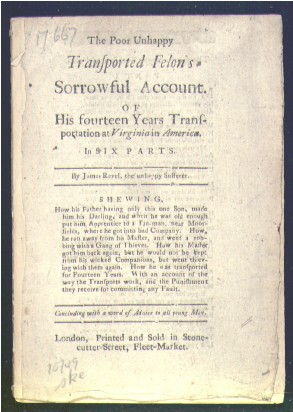| << Chapter < Page | Chapter >> Page > |
While slave labor comprised the majority of the plantation workforce across the Americas, it was never the sole labor system in use. Historical records now show that slaves often worked alongside transported laborers and/or indentured servants. One document in the ‘Our Americas’ Archive Partnership (a digital archive collaboration on the hemispheric Americas), James Revel’s poem “The Poor Unhappy Transported Felon’s Sorrowful Account of His Fourteen Years Transportation, at Virginia, in America…,” provides rare insight into life and labor in colonial America. As such, educators can use the document as a teaching tool within AP History or college introductory History courses.
Very little is known about Revel, but his account, composed at some point during the eighteenth century, traces his path from rebellious teen to Chesapeake tobacco laborer. In the document Revel states that he lived in England until he was caught stealing and was sentenced to transportation, which was, “A just reward for my vile actions base.” As one historian notes, transportation was Britain’s, “adopt[ion] [of]foreign exile as a punishment for serious crime” (Ekirch, 1). During their period of exile, felons could experience a wide array of treatment at the hands of their employers as, “Parliament enacted laws to prevent their early return home but took no steps to regulate their treatment either at sea or in the colonies”(Ekirch, 3). Revel’s exile began in Virginia where he worked for a farmer who was abusive and cruel. Upon his master’s death, Revel was sold to a “tenderly and kind” individual who eventually arranged for Revel to travel back to England as a free man. For a solid overview of transportation as a British punishment, see Frank McLynn’s Crime and Punishment in Eighteenth-Century England (2002).
The poor unhappy transported felon's sorrowful account

To begin with, educators can incorporate Revel’s poem into the classroom within a discussion of transportation as one method of colonial labor supply. Whereas AP and introductory courses often cover indentured and slave labor, transported laborers remain unacknowledged and this misses an opportunity to display the interconnectedness of the Atlantic economy. Specifically, a lecture on transportation would fit well within a U.S. course section on the late colonial period. The height of transportation was from 1718 (the passage of the British Transportation Act) to the early 1770s (the build-up to the American Revolution). One possible classroom exercise would be to read Revel’s poem alongside another primary document set, such as the transported passenger lists printed within Peter Wilson Coldham’s Bonded Passengers to America (full biographical details follow the module). While the poem attaches a personal face to this labor phenomenon, the lists present the broader picture of where the convicts departed from, the dates they departed, the arrival locations, and, on occasion, the crimes supposedly committed.

Notification Switch
Would you like to follow the 'Slavery in the americas' conversation and receive update notifications?